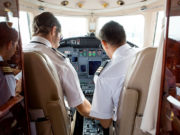An aviation industry committee has recommended that the U.S. Federal Aviation Administration (FAA) allow an alternative path for pilots seeking an airline transport pilot (ATP) certificate.
The proposal by the Air Carrier Training Aviation Rulemaking Committee (ACT ARC) calls for the FAA to authorize creation of an enhanced qualification program (EQP) that would lead to issuance of a restricted-privileges ATP (R-ATP) certificate.
For years, ATP candidates have been required to accumulate a minimum of 1,500 flight hours. Regulatory changes now provide credit toward that flight hours requirement for current and former military pilots and graduates of certain aviation degree programs, enabling them to be granted R-ATP certificates and to serve as second-in-command in air carrier operations. The ATC ARC was asked to identify alternative ways for pilots to qualify for an R-ATP.
The ARC said Thursday that its proposal “includes substantial prerequisites, a rigorous candidate assessment process and intensive, integrated academic and flight training designed to accelerate acquisition and development of knowledge and skills necessary to effective performance in an air carrier line operations environment.”
Under the recommendation, air carriers could develop EQP programs that would admit pilots who are either graduates of U.S. military pilot training schools or of colleges and universities with aviation programs authorized under U.S. Federal Aviation Regulations Part 61.160. The pilots would be required to have commercial pilot certificates and ratings for instrument and multi-engine airplanes.
“An air carrier EQP builds on the knowledge base and skills acquired by an individual who previously completed one of those [Part] 61.160 training programs,” the ARC recommendation said. “The structured, intensive, as well as integrated academic and flight training of an EQP is designed to further accelerate acquisition and development of knowledge and skills necessary for effective performance at an air carrier. In our view, reducing the total number of flight hours is justified because a pilot successfully completing an EQP, followed by the air carrier’s indoctrination and initial new hire (INH) flight training, can be expected to perform at levels equal to or exceeding those of pilots obtaining an R-ATP certificate in accordance with existing [Part 61.160] pathways alone.”
The Air Line Pilots Association, International (ALPA), which represents 58,000 pilots at 33 U.S. and Canadian airlines, criticized release of the recommendations as premature, adding that they are only part of a larger package of recommendations being prepared by the ARC.
“ALPA is supportive of the existing pathways that help prepare individuals for careers as professional airline pilots,” the organization said. “However, we do not support programs that shortcut or undermine the valuable training and experience that are necessary to develop the judgment required to be a safe and qualified professional pilot.”
